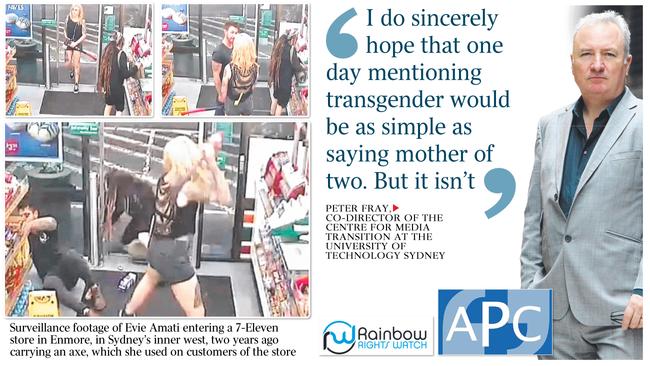Transgender community presses its case
A lobby group is trying to shape reporting on transgender issues; but where is the line between relevant and gratuitous?

When 24-year-old transgender woman Evie Amati swung an axe at two 7-Eleven customers in 2017 while they tried to buy a pie and a carton of milk, she could not have known she would spark a national debate about media freedoms. Nor could she have predicted she would be at the heart of a lawsuit against the Australian Press Council for discrimination against the trans community.
News organisations revealed lurid details about Amati’s life following the attack: she was a gifted student, a drummer in a punk rock band, and the child of two prominent union reps in Perth.
She had also spent the first 20 years of her life as a male named Karl.
Amati’s transgender status later became a key issue at her trial. Her defence barrister, Charles Waterstreet, argued among other mitigating factors that at the time of the attack she had been affected by hormone medication and suffered mental health issues linked to her gender dysphoria.
A small transgender lobby group, Rainbow Rights Watch, took issue with the way her charges had been reported by several major news sites.
It fired off complaints to the press council, arguing that prominent reporting of Amati’s transgender status added to the discrimination already faced by the community and was irrelevant to her alleged criminality.
The Sydney-based group has become a headache for the press council — swamping it with complaints about reporting on transgender issues. The group keeps a low profile but appears to be single-handedly trying to shape reporting on transgender issues by tying up the media in complaints that take many executive hours to resolve. The council’s constituent members will meet today to discuss the body’s handling of issues related to the transgender community.
The press council has been dragged by Rainbow Rights Watch before the NSW Civil and Administrative Tribunal, accused of discriminating against transgender people by treating the group’s complaints less favourably than equivalent claims from refugees, Muslims and others. The dispute was referred to NCAT by the NSW Anti-Discrimination Board.

The issue was thrust into the spotlight this week by the press council upholding two complaints — believed to have been lodged by Rainbow Rights Watch — against The Daily Mailand nine.com.au for referring to the transgender status of a woman charged with manslaughter.
The woman, Jade Walker — the sister of NRL star Dylan Walker — had been charged over the death of her boyfriend following a domestic violence incident but was later cleared by police.
The press council ruled Walker’s transgender status was not relevant to the alleged criminality and that by reporting it the sites had breached the council’s general principles.
One of the difficulties is that there are no media guidelines in place on when it is appropriate to report a person’s transgender status. The press council is trying to formulate LGBTIQ guidelines in consultation with community and industry representatives, but they are still 12 to 18 months from completion.
Rainbow Rights Watch declined repeated requests from The Australian this week for interviews. But according to documents filed with the corporate regulator, it has three directors — Claire Southey, a technical integration manager; Lilian Dean, an IT architect; and Warner Ward, an IT systems engineer who is also on the board of gay and lesbian counselling service Twenty10.
Last year it analysed almost 7000 Australian articles published in 2016 and 2017 concerning transgender people and published a report that found they were overwhelmingly negative and frequently contained prejudicial language, slurs and inaccuracies.
Its action before NCAT relates to the press council’s decision to dismiss Rainbow Rights Watch’s complaint against News.com.au over a profile it ran on Amati shortly after she was charged.
It revealed she had previously been known as Karl and included details, publicly available on her Facebook page, about her transition.
The council found the piece was fair and balanced, did not make derogatory comments and did not suggest her transgender status caused the attack.
It dismissed most of a similar complaint against The Daily Mail, which had also published details of Amati’s sex-change operation in Thailand, although the press council found The Daily Mail’s publication of photos of Amati’s family and friends was in breach of its principles.
However, the press council’s adjudications this week against The Daily Mail and nine.com.au — which some have cynically suggested might be linked to the NCAT action — have prompted concerns the public’s right to know is being unnecessarily curtailed to appease the grievance industry and that it is out of touch with the modern media.
The press council found the publications breached its general principle 6, which requires the media to avoid causing “substantial offence, distress or prejudice” unless it is in the public interest.
News.com.au editor-in-chief Kate de Brito said this week the press council seemed “determined to censor the media from using the word ‘transgender’ ”.
Daily Mail Australia managing director Peter Holder said his organisation was a committed press council member but was “becoming increasingly concerned and frustrated” by the way it was “being held to ransom by a small but well-drilled group which appears to oppose any use of the ‘T word’ ”.
Readers also commented angrily on The Australian and Mumbrella’s websites about “people telling us what we can and cannot hear” and questioning why it was more relevant to report an alleged attacker was “some football player’s sibling” than transgender.
However, Transgender Victoria’s Sally Goldner says gratuitous reporting of a person’s transgender status, when it is not relevant to a story, reinforces the negativity and prejudice that members of the community already face.
“We’re not curiosity objects,” she says. “We hear so much of this debate about freedom and we don’t hear about the other side of the coin, which is responsibility.”
Goldner says she finds it “incredibly sad” that after almost 25 years advocating for transgender rights, there is still no policy in place to guide the media on appropriate reporting.
“The fact it’s taken so long is really quite frustrating,” she says. “It needs to be (formulated) with a wide range of community involvement. Unfortunately, we haven’t been consulted and we would like to be.”
Peter Fray and Derek Wilding, co-directors of the Centre for Media Transition at the University of Technology Sydney, agree with the press council’s rulings this week.
Fray, a former editor-in-chief of The Sydney Morning Herald and deputy editor of The Australian, says referring to a person’s transgender status helps to drive web traffic. “It’s a great clickbait headline,” he says. “Let’s not shy away from that.”
But he argues a person’s transgender status should be reported only if it is relevant to a story, and it is “very hard to see how it was relevant” in Walker’s case.
He says although Walker identified publicly as transgender, revealing this information was different to other details routinely included in stories, such as a person being a “mother of two”.
“What we’re seeing here now is a clear case of something that’s evolving,” he says. “I do sincerely hope that one day mentioning transgender would be as simple as saying mother of two. But it isn’t.”
Wilding says “screaming” a person’s transgender status in a headline is not a responsible way to treat the issue — and he argues it should be omitted from a story altogether unless it is clear it is relevant to a case.
“We know that in some cases it can be harmful to make an association between transgender status or some other characteristic, and unlawful conduct. Assumptions can be made to link the two in a way that’s pathological, and that’s just not right,” he says, adding that “avoiding unnecessary harm” outweighs the benefit of including an “extra piece of information that may be of interest to people”.
Press council chairman Neville Stevens and chief executive John Pender refused to comment for this article.
However, former press council chairman David Flint, an emeritus professor of law, says he was “very surprised” by its adjudications this week. News articles routinely refer to a person’s gender and he says he cannot understand what is offensive about revealing a person’s transgender status.
Flint says there are sometimes similar disputes over whether a person’s nationality should be revealed in articles, but he personally sees “no difficulty in that sort of thing being mentioned”.
“It’s part of the description,” he says. “It would be a significant fact about the person that would not be there. It’s not suggesting a particular group of people are more prone to doing something.”
While some believe that Rainbow Rights Watch’s campaign of complaints has been unprecedented in the press council’s history, Flint says other groups in the past have also monitored the media’s reporting on certain issues and responded by complaining to the body.
“I don’t think this is unusual that once people have a position, they might wish to make complaints,” he says. “I think bodies should be strong in that regard.”
Holder revealed this week that the Daily Mail Australia had received complaints about articles published by The Daily Mail in Britain and the US, which appeared under its local masthead if accessed via search engines.
He says a distinction needs to be made between complaints triggered by “genuine offence” and those arising from “key word searches for articles”.
“There’s a huge difference between being offended and looking to be offended,” he said this week.
Similarly, Flint believes the press council should distinguish between complaints from individuals who are the subject of an article and “public interest” complaints from third parties.
He says the latter, if accepted by the press council, should be given a much lower priority, and the fact it is lodged by a third party should be taken into consideration during the complaints-handling process.
“A person who claims specifically to be injured is very different and I think has a greater claim for attention than people acting claiming they’re trying to clean up the media,” he says.




